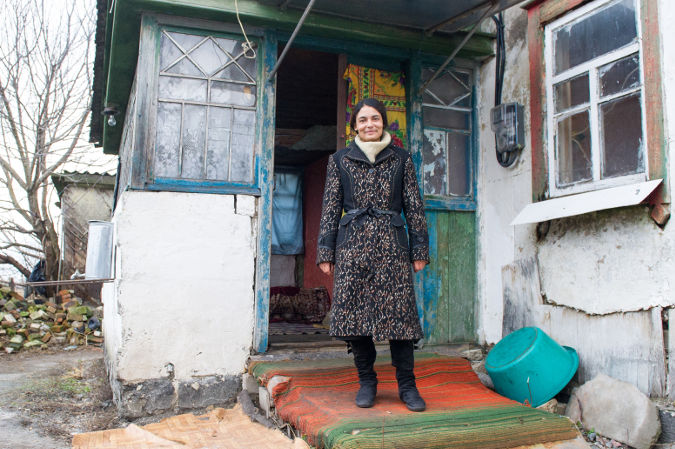From Where I Stand: “I am determined to help my children take full advantage of their rights as citizens”
Anastasia Muntyan, 28, is a Roma woman who lives in a village near Kyiv, capital of Ukraine. She moved here from her hometown near Odessa in southern Ukraine when she got married, leaving her community behind. She is now renting a small house with her husband and two children, but lives in near poverty and faces many obstacles as a representative of an ethnic minority. She recently participated in a UN Women training on the human rights of Roma Women, which helped her understand her rights as a citizen and act upon them.Date:

![]() I should be using my time better because I finished middle school and can read. But I got married and moved villages when I was still young so I had to find an occupation to support our family. Last year, I applied to work at a local food factory as they pay decent wages but was rejected without an explanation. My source of income now is from reselling walnuts. I buy them from a local wholesaler, crack their shells, then I resell them. It is an unnecessarily manual task that can be made easier with the help of a nut cracker, a simple automated machine, so I am saving money to buy that.
I should be using my time better because I finished middle school and can read. But I got married and moved villages when I was still young so I had to find an occupation to support our family. Last year, I applied to work at a local food factory as they pay decent wages but was rejected without an explanation. My source of income now is from reselling walnuts. I buy them from a local wholesaler, crack their shells, then I resell them. It is an unnecessarily manual task that can be made easier with the help of a nut cracker, a simple automated machine, so I am saving money to buy that.
My sons are four and two years old and I want them to get an education. Otherwise they will have difficulty earning decent wages. But I haven’t placed them in kindergarten yet because they are not officially registered. Registering them is difficult because I am caught between two things. If I do not continue with their registration, they will not be able to access education, medical services, and many other things; but if I leave home, I cannot clean the nuts and will lose money.
Registration can take very long. It took me over a year to update my passport picture after I turned 25. The authorities required me to update it at the place of issue, almost 500 kilometers away from my current home, impossibly far, considering that sometimes I cannot afford to go to the next village. The head of my village council helped me to resolve the situation over the course of a year, but meanwhile, I could not receive any of the benefits I am entitled to as a citizen. One of the benefits I was missing was a government stipend to improve my living conditions because my current house, although very warm, does not have running water.
But I am determined to get my children registered so that they can take full advantage of their rights, and most importantly so they can start going to school.”
Anastasia Muntyan had to take two buses and travelled for over two hours to the neighboring village to participate in a group discussion on the human rights of Roma women, organized by UN Women and International Roma Women Charitable Fund Chiricli. Her story relates to the new Sustainable Development Goals, including SDG 1 on ending poverty, which seeks equal rights to economic resources, and SDG 8 which calls for sustained, inclusive and sustainable economic growth, full and productive employment and decent work for all, particularly for women and those in precarious employment.